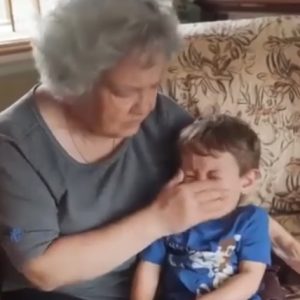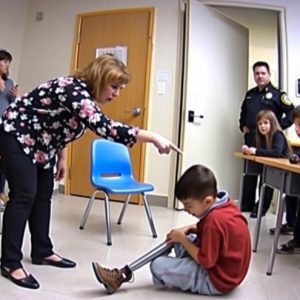I was thirty-one, a middle school art teacher with a slightly burnt-out smile and a rescue cat named Ink who judged me from high places. I taught my kids how to express themselves with color and texture, but somewhere along the line, I’d stopped doing that for myself.
Then I met Jason.
He was calm in a way that made me feel safe—gentle, soft-spoken, the kind of guy who texted “made it home safe?” after a date and meant it. We met at a charity run neither of us wanted to be at, bonded over our mutual hatred of kale smoothies, and never stopped talking.
By the end of the year, we were married.
Jason was my best friend, my soft place to land—but his family?
His family didn’t see me.
They saw through me.
At our wedding, I stood in a white lace dress with a bouquet of peonies, smiling for the photographer, when Jason’s mother, Claudette, tugged at my elbow. “Oh, sweetheart, would you mind stepping aside? Just for a moment. We’d like a shot of just the immediate family.”
I blinked. “I’m the bride.”
She smiled. “Of course you are. This is just tradition. You understand.”
Jason shrugged. I stepped aside. Later, that photo—the one I wasn’t in—got framed and placed above their fireplace.
That was the tone they set, and it only deepened with time.
They had dinners, cabin trips, birthday barbecues. I’d hear about them secondhand—Jason casually mentioning them like forgotten errands. I started pretending I was too busy when, really, I just didn’t want to feel invisible anymore.
And he never defended me.
“They’re just old-fashioned,” Jason would say, brushing it off. “Don’t take it to heart.”
But I did. How could I not?
Then came the turning point: my grandmother passed.
She was the only real family I had left—the woman who sent me handwritten recipes, who taught me how to make pie crust from scratch, who called every Sunday without fail just to hear how my week went.
Losing her felt like losing the last anchor in my life.
What most people didn’t know was that Grandma had left me a trust fund. Quietly, privately, she’d been planning for my future. It wasn’t flashy money, but it was enough to make things comfortable—and suddenly, I wasn’t invisible anymore.
I was golden.
Texts flooded in. Invitations I’d never received before—brunches, spa days, “girl time.” Grant, Jason’s dad, pulled me aside with a twinkle in his eye and said, “I’ve always thought of you as a daughter, you know.”
Of course you have.
I smiled. I nodded. I accepted the lemon pie and the wine spritzers and let them think I was playing along.
But I was planning.
At dinner one night—my third invite that month—Grant leaned back in his chair and said casually, “The Tahoe house needs some upgrades. A new deck. A better kitchen. Something worthy of family holidays.”
Claudette chimed in: “Everyone’s pitching in, darling. And since you’re doing so well now…”
I set down my fork.
“Sure,” I said. “On one condition.”
They all looked at me.
“Show me every family photo I was in over the last five years. Every event I was invited to. If we can hit ten, I’ll consider it.”
The silence that followed was delicious.
Claudette blinked. Ivy’s smile cracked. Jason stared down at his plate like it could save him.
“That’s not fair,” Claudette whispered.
“No,” I said, voice steady. “What’s unfair is spending years trying to be part of something that never wanted me—until I became financially convenient.”
Jason didn’t defend me.
That night, we drove home in silence. When we pulled into the driveway, I didn’t move. My hands rested in my lap.
“I married you, Jason. Not them. But you let them cut me out—slice by slice—while you stood by and said nothing.”
He sighed. “Freya, this is about your pride—”
“No,” I cut in. “It’s about my dignity.”
He rubbed his temple. “You’re overreacting.”
And there it was. The line that always meant: Sit down. Be smaller. Don’t make this uncomfortable for everyone else.
But I was done shrinking.
That night, I stared at the ceiling while he snored beside me. I heard all their voices in my head. Claudette’s faux sweetness. Ivy’s empty praise. Grant’s opportunistic charm. And Jason’s silence—always silence.
The next morning, I fed Ink, opened my laptop, and made a call.
A month later, I left.
I took my books, my baking tins, my paintbrushes, and the cat. I left behind the framed wedding photo, the joint checking account, and the memories that no longer made sense.
“You’re throwing away our marriage because of my family?”
“No,” I said gently. “I’m saving myself from being disposable.”
They didn’t call. They didn’t ask if I was okay.
Ivy unfollowed me. Claudette posted a photo of a “tight-knit family dinner” without me, her caption full of hashtags and curated smiles.
But I didn’t feel bitter.
I felt free.
One afternoon, I sat at a lakeside café, sipping coffee and watching a family laugh at the next table. Their toddler spilled orange juice, and no one scolded her. They just laughed harder and passed napkins around.
No performance. No perfection.
Just love.
And that’s when I realized: I had spent years trying to earn a seat at someone else’s table, forgetting I could build my own.
The inheritance didn’t make me powerful.
Recognizing my worth did.
I was invisible to them before.
But now?
Now I’m unforgettable—and completely uninterested in being accepted by people who never saw me to begin with.





